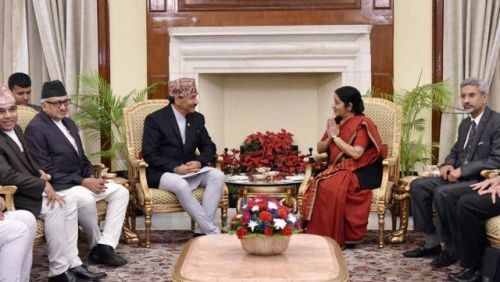AKIPRESS.COM -  In the first high-level engagement after the establishment of the new dispensation in Nepal, external affairs minister of India Sushma Swaraj held extensive talks with visiting Nepalese deputy prime minister and foreign minister Kamal Thapa, who briefed her about the current political situation in his country and expressed hope of finding a solution to the present turmoil at an early date.
In the first high-level engagement after the establishment of the new dispensation in Nepal, external affairs minister of India Sushma Swaraj held extensive talks with visiting Nepalese deputy prime minister and foreign minister Kamal Thapa, who briefed her about the current political situation in his country and expressed hope of finding a solution to the present turmoil at an early date.
From informed sources on both the Nepali and Indian side, HT has pieced together conversation between the two leaders, reports Hindustan Times.
After exchanging pleasantries, Swaraj was quick to ask Thapa about steps being taken to address challenges ‘particularly in the Tarai’. A movement by the Madhesis has paralysed life across the plains and disrupted cross border supplies.
Thapa briefed her on the process of reconciliation. He began on a personal note and said he too had voted against the constitution, acknowledged there were ‘genuine concerns’ and that some ‘earlier understandings’ had not been ‘honoured’.
He also said, according to top sources, it ‘would have been better if all issues had been addressed before the promulgation of the constitution’. This was the position the Government of India had taken, when it sent foreign secretary S Jaishankar as special envoy to Nepal.
But then Thapa said it was time to ‘move forward’. The Nepal government had appealed to agitating Madhesi parties for talks. There were two amendments tabled in Parliament. He recognised the political nature of the problem, and need for a political solution said, “We are committed to coming out with a solution in the shortest period of time.”
The Nepali foreign minister flagged the issue of ‘movement of goods, particularly petroleum products’, and asked for Indian facilitation, especially in the wake of the upcoming Dasain festival. Shortages had caused hardship among common people. He did not, sources on both sides confirm, use the term ‘blockade’.
Swaraj emphasised that Nepal was India’s ‘dearest and nearest neighbour’ and pointed out that at any point, five or six border crossings were open. And if there was obstruction, it was because of protests by a ‘section of the Nepali population’.
She also flagged the fact that over 200 Indian trucks had been stranded in Nepal, and 300 Nepali Oil Corporation tankers were stranded in Raxaul on the Indian side. “If you create security and harmony in Tarai, it will enable uninterrupted commerce.”
Thapa then asked about the possibility of movement at points where there is no protest. Swaraj reiterated this was happening and India would continue to facilitate this ‘within existing capability and border infrastructure constraints’. This is significant for over half the petroleum products flow through Birgunj-Raxaul, where on most days, over 50,000 protestors block the border.
Thapa met NSA Ajit Doval, home minister Rajnath Singh and is expected to see PM Narendra Modi on Sunday.
